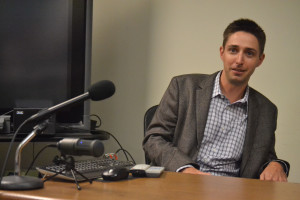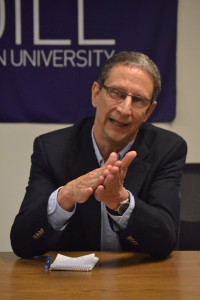Veteran journalists David Philipps and David Finkel shared field notes and the backstory behind some of their most prominent work in an Oct. 1 panel held as part of “Covering the Military, Veterans and Homeland Security: Tomorrow’s Trends and Issues,” the 2014 Medill National Security Journalism Initiative Conference. Couldn’t make it to their talk? Check out our rundown of each journalist’s talk below:
 Former Colorado Springs Gazette and current New York Times reporter David Philipps walked the crowd through the reporting process behind his Pulitzer Prize-winning series on military discharge-related corruption from May 2013 entitled “Other than Honorable” as a case-study in how good reporting, regardless of outlet size or resource sophistication, can make waves. Philipps said anyone with the time and willingness to dig deeply could undertake such an effort. An unlikely military reporter and self-describe “floater” whose resume also includes an alligator-wrestling certification, Philipps’ coverage of veteran’s affairs sprung out of his Colorado Springs hometown’s large veteran population and a then-surge in homecoming soldiers. He said a quick but hesitant indulgence of an initial tip about one soldier’s psychiatric hospital-to-imprisonment story lead to a months-long quest to track down additional victims and the data to back up his theory (or any plausible explanation for his observations). He stressed the value of FOIA requests and sources with knowledge of systematic workarounds to get crucial reporting information – such as military defense lawyers – and the importance of finding data to support controversial journalistic assertions. “I needed to show who these guys were, what happened to them, and then how they were treated in a very sort of narrative way in order to make anybody give a damn,” he said.
Former Colorado Springs Gazette and current New York Times reporter David Philipps walked the crowd through the reporting process behind his Pulitzer Prize-winning series on military discharge-related corruption from May 2013 entitled “Other than Honorable” as a case-study in how good reporting, regardless of outlet size or resource sophistication, can make waves. Philipps said anyone with the time and willingness to dig deeply could undertake such an effort. An unlikely military reporter and self-describe “floater” whose resume also includes an alligator-wrestling certification, Philipps’ coverage of veteran’s affairs sprung out of his Colorado Springs hometown’s large veteran population and a then-surge in homecoming soldiers. He said a quick but hesitant indulgence of an initial tip about one soldier’s psychiatric hospital-to-imprisonment story lead to a months-long quest to track down additional victims and the data to back up his theory (or any plausible explanation for his observations). He stressed the value of FOIA requests and sources with knowledge of systematic workarounds to get crucial reporting information – such as military defense lawyers – and the importance of finding data to support controversial journalistic assertions. “I needed to show who these guys were, what happened to them, and then how they were treated in a very sort of narrative way in order to make anybody give a damn,” he said.
 For Washington Post reporter, editor and author David Finkel, journalism is about more than just getting the story; it’s about getting into the story. During his panel address, the Pulitzer Prize-winner and author of “Thank You for Your Service” and “The Good Soldiers” – both of which revolve around the experience of Iraq War veterans – made the case for “immersion journalism,” or a style of reporting that entails hanging out around your reporting environment of choice and waiting and watching for stories to emerge. He said he keeps Ernest Hemingway’s maxim that a journalist’s responsibility is to understand, rather than judge at the forefront of his work. “My approach to understanding is when I go off to do a story, I have a question in mind,” he explained. “I don’t have an answer. That’s what the reporting’ll lead me to.” He emphasized the importance of taking immaculate notes to steel yourself against potential accusations of dishonesty or bias and the difficulty and necessity of cultivating strong source relationships in order to build the kind of trust that breeds access. Finkel also cautioned the reporters at the meeting to be conscious of the emotional and professional tug-of-war they’ll face over whether a reporter’s ultimate responsibility is to be loyal to sources or to the journalism vocation.
For Washington Post reporter, editor and author David Finkel, journalism is about more than just getting the story; it’s about getting into the story. During his panel address, the Pulitzer Prize-winner and author of “Thank You for Your Service” and “The Good Soldiers” – both of which revolve around the experience of Iraq War veterans – made the case for “immersion journalism,” or a style of reporting that entails hanging out around your reporting environment of choice and waiting and watching for stories to emerge. He said he keeps Ernest Hemingway’s maxim that a journalist’s responsibility is to understand, rather than judge at the forefront of his work. “My approach to understanding is when I go off to do a story, I have a question in mind,” he explained. “I don’t have an answer. That’s what the reporting’ll lead me to.” He emphasized the importance of taking immaculate notes to steel yourself against potential accusations of dishonesty or bias and the difficulty and necessity of cultivating strong source relationships in order to build the kind of trust that breeds access. Finkel also cautioned the reporters at the meeting to be conscious of the emotional and professional tug-of-war they’ll face over whether a reporter’s ultimate responsibility is to be loyal to sources or to the journalism vocation.





